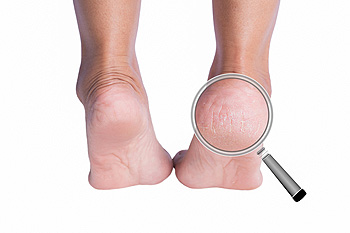At best, cracked heels are unsightly and bothersome. Left untreated, these dry, flaky and hard fissures can deepen and become infected. Cracked heels are dangerous to people with diabetes, and at worst they can lead to foot ulcers that may not heal. Cracked heels can occur if you walk barefoot frequently or wear shoes that expose your heels. You are also more susceptible to developing cracked heels if you live in a dry climate, are obese, or have sweat glands that do not function properly. You can help avoid getting cracked heels by keeping yourself hydrated, moisturizing your heels twice a day, and always wearing socks or shoes that cover the back of your feet and offer proper shock absorption with adequate soles. If the cracks deepen, bleed, or are painful, a podiatrist can treat or remove them and prescribe antibiotics if they are infected.
If the skin on your feet starts to crack, you may want to see a podiatrist to find treatment. If you have any concerns, contact one of our podiatrists from Romeo Foot & Ankle Clinic. Our doctors can provide the care you need to keep you pain-free and on your feet.
Cracked Heels
It is important to moisturize your cracked heels in order to prevent pain, bleeding, and infection. The reason cracked heels form is because the skin on the foot is too dry to support the immense pressure placed on them. When the foot expands, the dry skin on the foot begins to split.
Ways to Help Heal Them
- Invest in a good foot cream
- Try Using Petroleum Jelly
- Ease up on Soaps
- Drink Plenty of Water
Ways to Prevent Cracked Heels
- Moisturize After Showering
- Skip a Shower
- Keep Shower Water Lukewarm
- Don’t Scrub Your Feet
If you are unsure how to proceed in treating cracked heels, seek guidance from a podiatrist. Your doctor will help you with any questions or information you may need.
If you have any questions, please feel free to contact our offices located in Washington and Shelby Townships, MI . We offer the newest diagnostic and treatment technologies for all your foot care needs.

